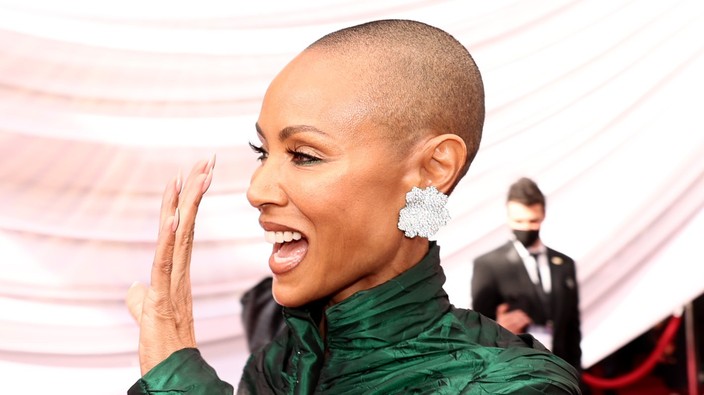at the time, she didn’t know why she was losing so much hair.
“i’ve gotten every kind of test there is to have,” she said. “they don’t know why.”
three years later, she opened up about her diagnosis.
what is alopecia?
alopecia is an autoimmune disorder, meaning the immune system attacks bodily systems it perceives as harmful — in this case, it attacks hair follicles, which the body then rejects. normally, people shed between 50 and 100 hairs a day, according to the canadian dermatology association, though new ones tend to grow back to replace the missing hair. with alopecia, the hair follicles become smaller, and eventually stop growing hair.
there are several kinds of alopecia. with female pattern baldness — androgenetic alopecia — hair typically thins on the top of the scalp. it can be due to aging, genetics, or hormonal factors. alopecia areata, which is what pinkett smith is said to have, is an autoimmune disease whether the body attacks its own hair follicles, “often causing hair to come out in clumps,” according to the dermatology association. about two per cent of the population will develop it over their lifetime.
there are other subtypes, too: alopecia areata totalis (complete hair loss on the head), diffuse alopecia areata (hair thinning, rather than bald patches), frontal fibrosing alopecia (receding hairline), ophiasis alopecia areata (hair loss in a ring shape on the sides and back of the head) and alopecia areata universalis (hair loss on the entire body).
there’s also traction alopecia, which usually causes hair loss specifically in an area where hair is pulled — for instance, if someone regularly wears a very tight ponytail, the hair follicles in that area can become damaged and are sometimes unable to grow more hair. this kind of hair loss is common in black women, according to healthline, and can be caused in part by braids or cornrows that are very tight. it’s also common in ballerinas and gymnasts who regularly wear very tight buns.
one study found a higher lifetime incidence of alopecia areata in black and hispanic women as compared to white women. “other immune-mediated diseases are known to disproportionately affect certain racial or ethnic groups,” the authors wrote. lupus, for example, disproportionately affects women with african or hispanic ethnic backgrounds.
there’s no cure for alopecia. doctors sometimes suggest corticosteroids, topical medications or minoxidil (sold under the brand name rogaine), and light radiation therapy, but “these medicines have differing amounts of success in regrowing hair,” reports webmd.
it’s also not clear what causes it, although alopecia is thought to be at least partly genetic. it’s most common in people with a family history of autoimmune disorders like rheumatoid arthritis or type 1 diabetes. it’s also more common in women than men. in rare cases, it can also affect children.
 5 minute read
5 minute read










